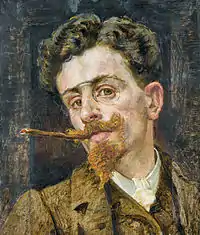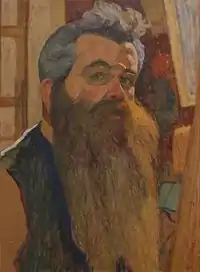Sigismund Righini
Carlo Pietro Sigismund Righini (4 January 1870, Stuttgart - 24 October 1937, Zürich) was a Swiss painter and art association executive.


Biography
He came from a family that included a long line of decorative painters, originating in Bedigliora. His father, Francesco (1837–1914), followed in the family tradition as well as being a master builder. His mother, Katharina Steinbrecher (1838–1925) was a native of Stuttgart.
He attended school in Zürich. On the advice of Ottilie Roederstein, he left immediately after graduating (in 1888), and went to Paris, where he enrolled at the Académie Colarossi. His first instructor was Jean-André Rixens. While there, he met and became engaged to a fellow student, Constance Macpherson (1871–1957), from England. They were married in 1893. After stays in Italy and Ticino, they moved to Zürich. Their daughter Katharina (1894-1973), would later marry the painter Willy Fries and give birth to Hanny Fries, who would also become a painter.
Free from pressing financial obligations, he devoted himself entirely to his work. In 1898, he moved into a new studio, built by his father, where he produced still-lifes, portraits and nudes. He also worked in plein aire for a time, when he was flirting with impressionism. Later, he travelled extensively, visiting the Low Countries in 1903 and England in 1910. In 1904, he began to experiment with brighter patches of color; perhaps influenced by Cézanne and the Fauvists or his friends Giovanni Giacometti and Cuno Amiet. He showed his work at numerous exhibitions until around 1920, when he stopped painting to focus on his membership and executive positions in numerous art associations. During this time, he still did colored pencil drawings while otherwise unoccupied.
After 1915, he was a member of the Federal Art Commission and served as its Vice-President from 1923 until his death. He was an indefatigable promoter of modern art in every position he held.[1] Following World War I, the Federal Council commissioned him to oversee the importation of art works into Switzerland. This also became a life long assignment.[2]
Much of his work is in private hands, but his estate is retained by the Stiftung Righini Fries of Zürich, established by Hanny Fries and her husband Beno Blumenstein (1924–2010). Some paintings are also to be seen at the Kunstmuseum Solothurn and the Kunsthaus Zürich.
References
- Rudolf Koella: Sigismund Righini, Maler, Zeichner, Kunstpolitiker. Offizin Verlag, Zürich 1993, S. 119.
- Daniel Widmer: «Sein Auge wachte überall» : Sigismund Righini und der Bundesratsbeschluss vom 15. Juli 1921 über die Beschränkung der Einfuhr von Kunstgegenständen. Lizentiatsarbeit phil. Fak. I (Prof. Dr. Franz Zelger) Universität Zürich, als Typoskript vervielfältigt; Männedorf 1991. / Peter Kraut: «Für eine gerechte Überwachung ist gesorgt» : die Eidgenössische Kunstkommission und die Einfuhrbeschränkungen für Kunstwerke in der Zwischenkriegszeit. Lizentiatsarbeit phil.-hist. Fak. (Prof. Beatrix Mesmer) Universität Bern, als Typoskript vervielfältigt; Bern 1991, bes. S. 39–48 und S. 54–57.
Further reading
- Rudolf Koella: Sigismund Righini, Maler, Zeichner, Kunstpolitiker. Offizin Verlag, Zürich 1993, ISBN 3-907495-47-0.
- Katharina Fries-Righini: Wie die Tochter ihn sah : ein Erinnerungsbild. In: Rudolf Koella: Sigismund Righini, Maler, Zeichner, Kunstpolitiker. Offizin Verlag, Zürich 1993 ISBN 3-907495-47-0,
- Andrea Lutz and David Schmidhauser: Sigismund Righini, im Bann der Farbe, Museum Oskar Reinhart, Winterthur 2016 ISBN 978-3-9524268-5-2.
- Sigismund Righini, Willy Fries, Hanny Fries: eine Künstlerdynastie in Zürich, 1870-2009, Ed. by Sascha Renner; Verlag Scheidegger & Spiess, 2018 ISBN 978-3-85881-601-6.
External links
- Righini, Sigismund in German, French and Italian in the online Historical Dictionary of Switzerland.
- "Righini, Sigismund". SIKART Lexicon on art in Switzerland.
- More works by Righini @ ArtNet
- Stiftung Righini-Fries